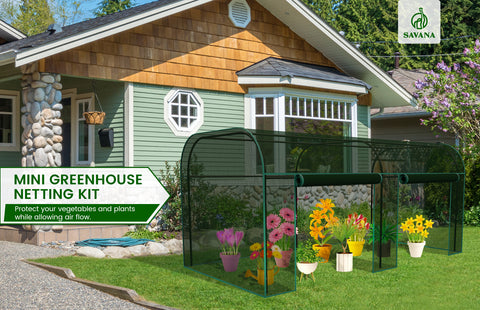There are a lot of myths and misconceptions when it comes to weed prevention. One of the most common is that you need to use thick mulch to prevent weeds from growing. But is it really the case? Or can you use a thinner layer of mulch and still successfully keep weeds in the bay? In this article, we'll take an in-depth look at the relationship between mulch and weeds, and help you answer the question "Does thicker mulch prevent weeds?"The following content also has some reference value for raised garden beds.
Does thicker mulch prevent weeds?
The short answer is: no, thicker mulch doesn't necessarily prevent weeds. However, mulch can be an effective tool in the fight against weeds, especially if it is used in conjunction with other weed prevention strategies.
Many gardeners like to use mulch to help keep weeds from taking over their flower beds. Mulch is a material that is spread over the surface of the soil, such as bark, compost or straw. It acts as a barrier between soil and air, helping to retain moisture and preventing weed seeds from germinating.
While it's true that a thick layer of mulch can suffocate small weed seedlings, also keep in mind that mulch will break down over time. In the process, it becomes thinner and less effective at suppressing weeds. In addition, thicker mulch can sometimes create an ideal environment for weed seeds to germinate by trapping heat and moisture near the soil surface.
What is mulch?
Mulch is anything that is spread over the surface of soil to protect it from erosion, keep it moist, or provide nutrients. Common mulches include leaves, straw, wood shavings, and bark. Landscapers often use mulch to emphasize plants and give the garden a neat look. In addition to aesthetics, mulch helps to curb weed growth, reduce evaporation, and protect plants from extreme temperatures.
Mulch is usually used in a layer 2 to 4 inches thick. It should be reapplied once a year or kept as deep as needed. There are several different types of mulch available, so it is important to choose the right mulch for your garden. Bark mulch, for example, helps prevent weeds from growing, while leaf mulch is ideal for adding nutrients to the soil.
What's the difference between thick mulch and thin mulch?
The difference between thick and thin mulch has as much to do with how thick the composition is as it does with how deep the layer is on the garden bed. Thick mulch is more than three inches deep, while thin mulch is three inches deep or less.
Thick mulch is usually made of organic material such as bark or wood chips and is at least two inches deep. This type of mulch is ideal for areas where weeds are a problem, as a thick layer helps prevent them from taking root. In addition, thick mulch helps retain moisture, making it ideal for use in drought-prone areas.
Thin mulch, on the other hand, consists of smaller materials, such as straw or shredded leaves. This type of mulch breaks down faster, so it needs to be replaced more often. However, it is easier to apply than thick mulch and it does not require as much effort to spread evenly. Thin cover is also less likely to blow away in windy conditions.
How do I prevent weeds from growing on my mulch bed?
Weeds can easily take over mulch beds if left unchecked. Fortunately, there are things you can do to reduce the chances of weeds growing in mulch beds.
preplanting
If your soil is bare, use a pre-germination weed killer to prevent weeds from germinating and growing in the mulch. This type of herbicide prevents weed seeds from germinating, and it will also kill any small weeds that have germinated. Apply emergency herbicide before you apply mulch, then follow the manufacturer's instructions for watering. You should also reapply the herbicide every few months to maintain its effectiveness.
Consider using herbicides in combination with secondary weed prevention barriers. Consider using materials like black plastic or newspaper, which block sunlight and prevent weed seeds from germinating. Be sure to secure the edges of the plastic or newspaper so they don't blow away. Secondary barriers to these types of landscape fabrics will be particularly helpful for perennial weeds.
After planting
If you already have a weed problem in your existing mulch bed, you can use a post emergence herbicide to kill the weeds. When using herbicides, be sure to follow the manufacturer's instructions carefully and always wear gloves and protective clothing to avoid exposure to chemicals.
Killing weeds can be tricky when you have other plants in your landscape area, so take your time to avoid affecting the roots of plants you don't want to kill. Before adding new mulch, you want to make sure the existing weeds are dead.
Tips for choosing a safe type of covering that won't cause harm to you or your pet
If you're looking for a way to add some extra protection to your plants and garden, mulch is a great option. But with so many different types of mulch, knowing which one is right for you can be tricky. Here are some tips to help you choose a safe and effective mulch for your needs:
Avoid using treated wood chips or bark, as these may contain harmful chemicals that may leach into the soil.
Stay away from recycled rubber tires or other synthetic materials, which can release harmful toxins over time.
Stick with organic foods, such as bark, leaves, or grass clippings, which break down safely and provide nutrients for your plants.
How thick should my mulch layer be?
There is one thing to overdo when it comes to applying mulch, and it will depend on the type of mulch you use. A thick layer can actually do more harm than good. Mulch more than three inches deep smothers plant roots and prevents water and air from seeping into the soil. In addition, thick mulch can create an ideal growing environment for pests and diseases.
For these reasons, it is important to pay attention to the thickness of your mulch layer. For most applications, a coating 2 to 3 inches deep is sufficient. Especially for organic mulch such as wood chips or straw, a mulch 2-4 inches thick is ideal. Inorganic mulch such as stone or gravel can be applied more thinly as they do not break down over time. Whatever type of mulch you choose, be sure to apply it evenly to your garden bed. Too much mulch can suffocate the plant, while too little leaves it vulnerable to the elements.
Overall, consider the type of mulch and how do you prepare your garden
Best of all, mulch, while not the perfect solution, can help keep weeds from taking over your garden. For best results, use it in combination with other weed prevention strategies, such as hand weeding, herbicides, and bare areas of land covered by plants.
Mulch is a great way to give your garden a neat appearance and curb weed growth. However, it is important to remember that mulch breaks down over time and needs to be replaced regularly. Choose the right type of mulch for your needs and be sure to apply it with the appropriate thickness to prevent problems. With a little attention, you can keep your garden tidy all year round.









